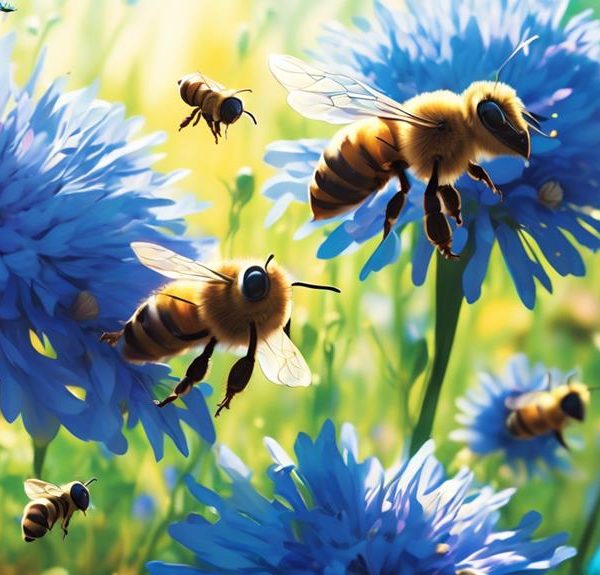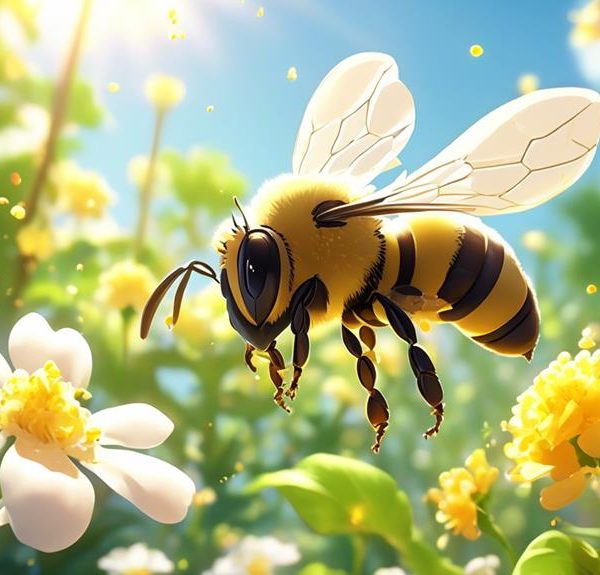Observe the baffling fascination bees have for bacon, and discover the surprising reasons behind their unusual attraction.
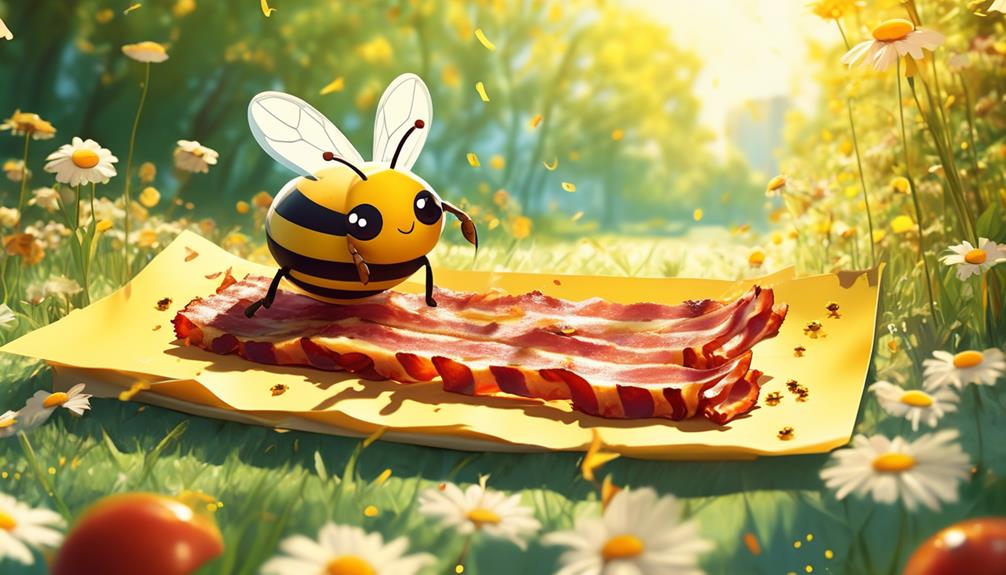
Do Bees Like Bacon
Bumbling bees buzzing by your breakfast bacon might seem bizarre, but have you ever wondered why? You're probably familiar with bees' love for nectar, but bacon is definitely not part of a typical bee diet. So why the interest?
Interestingly, it's not the bacon per se that attracts bees, but something else entirely. What could possibly make these tiny pollinators drawn to your morning delight? Stay tuned, and let's unravel this mystery together.
Key Takeaways
- Bees primarily consume nectar and pollen, with nectar providing carbohydrates for energy and pollen providing proteins and essential nutrients.
- Bees are attracted to salty foods in addition to sweet nectar, as salt is essential for their nervous system functioning and growth.
- Bacon is a critical source of sodium for bees, but it disrupts their natural feeding patterns and nutritional balance.
- Feeding bees bacon can increase the risk of bee stings, allergic reactions, and exposure to harmful additives.
Understanding Bee's Dietary Habits
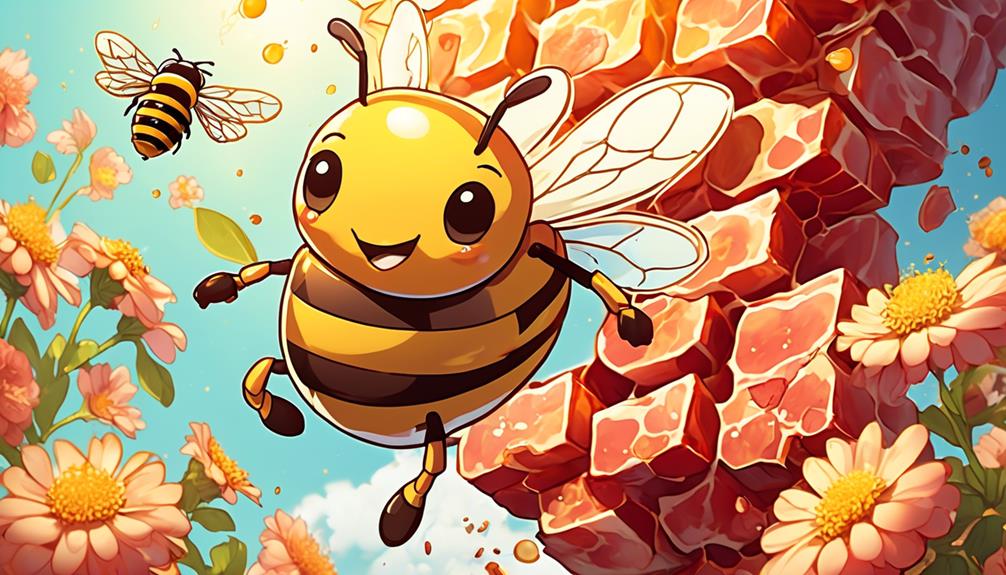
While you might find it amusing to imagine bees nibbling on your morning bacon, it's important to understand that these buzzing insects have a rather specific diet primarily composed of nectar and pollen. They're not remotely interested in your protein-rich breakfast.
As pollinators, bees play a crucial role in the ecosystem, with their diet playing a pivotal role in their survival and reproduction.
Bees' dietary habits are driven by their need for carbohydrates, protein, minerals, and vitamins. Nectar, a sugary fluid produced by plants, provides bees with energy in the form of carbohydrates. On the other hand, pollen provides bees with proteins and other essential nutrients. It's the primary source of lipids, vitamins, and minerals for bees, particularly for the brood's nutrition.
The dietary needs of bees vary throughout their lifecycle. Larvae rely more heavily on pollen, while adult bees require more nectar. It's a delicate balance that's essential to maintain hive health. Any disruption, such as exposure to pesticides or lack of diverse food sources, can severely impact bee populations.
Understanding these dietary preferences is key to preserving these vital pollinators.
The Attraction: Bees and Salty Foods

Surprisingly, bees aren't just attracted to sweet nectar; they're also drawn to salty foods, which fulfill a crucial dietary need. Salt is essential for their nervous system functioning and overall growth. You may wonder why then, do bees like bacon? The answer is simple – it's because of the salt content.
Like humans, bees need a balance of sugar and salt in their diet. While nectar provides them with sugar, they find salt in animal sweat, tears, and, yes, even in cured meats like bacon. Sodium ions in salt are critical for bees' cell function, aiding in nutrient absorption and waste removal.
When bees land on your picnic food, it's not just the sweet stuff they're after. They might also be seeking salt, which is scarce in their natural diet. They may even prefer salty over sweet. In one study, bees were found to favor salt-laden water over sugar water in certain concentrations. This attraction to salt explains why bees might be found buzzing around your bacon sandwich. They're not there for the pork; they're there for the salt.
Bacon: A Bee's Perspective
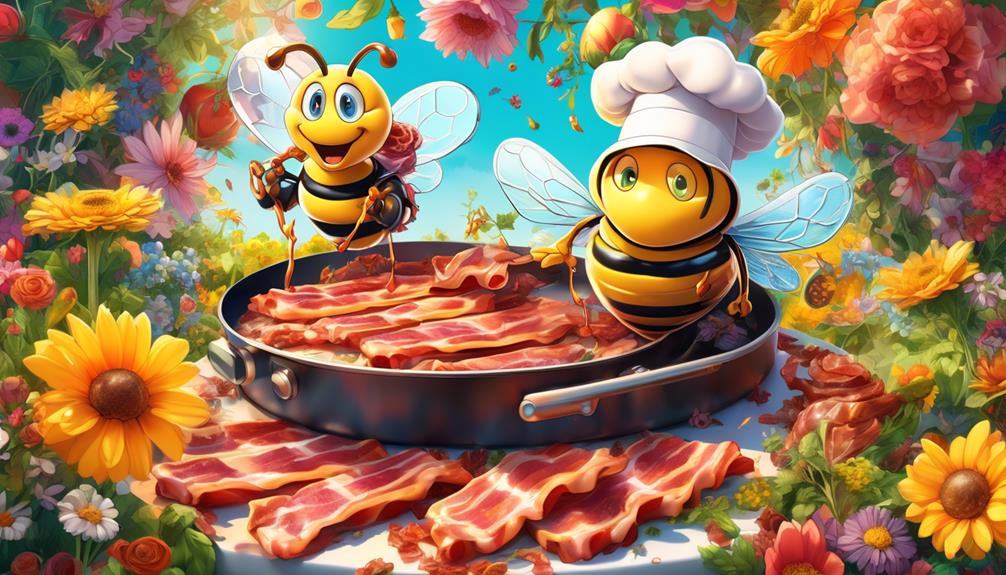
From a bee's perspective, bacon isn't just a tasty treat, but a critical source of sodium that helps them maintain optimal functioning and growth. You see, bees, just like humans, need a balanced diet to survive and thrive. This includes proteins, carbohydrates, and yes, even a trace amount of salt. Bacon, being rich in sodium, serves this purpose wonderfully.
Don't mistake this for a bee's love of bacon itself. It's not the smoky, savory flavor that draws them in. Rather, it's the essential nutrients they can extract from it. Sodium plays a pivotal role in a bee's diet. It aids in nerve function, muscle contraction, and maintaining a proper fluid balance within their tiny bodies.
While it's fascinating to think of bees buzzing around your breakfast table, lured by the scent of sizzling bacon, it's important to note that their interest is purely nutritional. Bees aren't after our food. They're just doing what they need to do to survive.
Scientific Experiments on Bees' Taste Buds
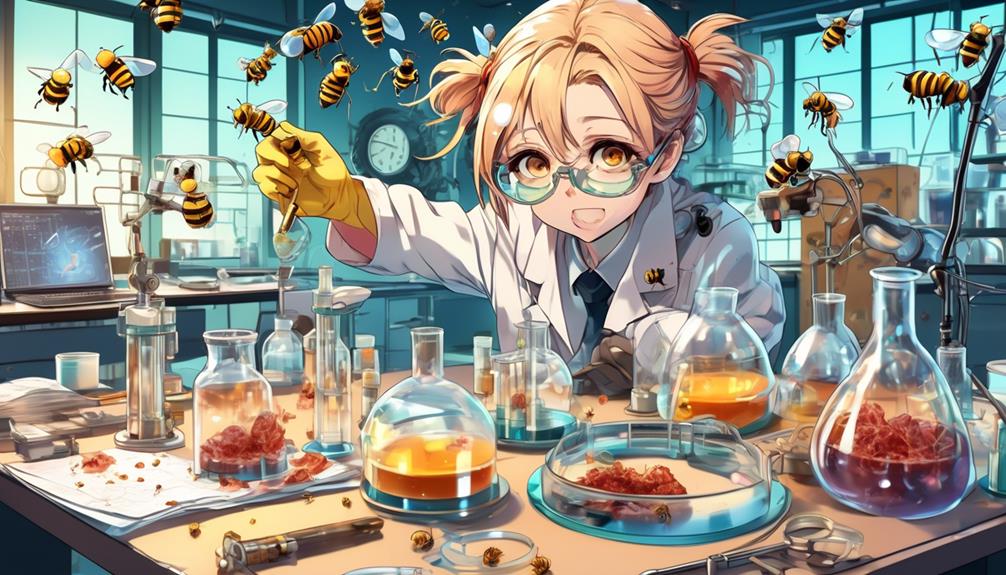
You might be wondering how scientists figured out that bees are attracted to salty, bacon-like substances, and the answer lies in various intriguing experiments conducted on bees' taste buds.
Scientists conducted numerous controlled experiments to analyze the taste preferences of bees. The experiments were methodically designed and executed with the utmost precision to ensure accurate results.
Here's a brief overview of the experiments:
Experiment | Method | Findings |
|---|---|---|
1. Preference Test | Bees were exposed to different foods, including bacon. Their responses were observed and recorded. | Bees seemed to show a clear preference for salty food items, similar to bacon. |
2. Electro-physiological Tests | Bees' reactions to different tastes were measured using electrodes. | Bees responded most strongly to salty tastes, similar to that of bacon. |
3. Behavioral Observations | Bees' behavior was observed when exposed to different food items. | Bees consistently chose salty food items, indicating a strong preference. |
These experiments not only highlighted bees' affinity for salty tastes but also underscored the complexity of their taste buds. So, while it's not quite accurate to say bees like bacon, they're certainly drawn to its salty allure.
Risks of Feeding Bees Bacon
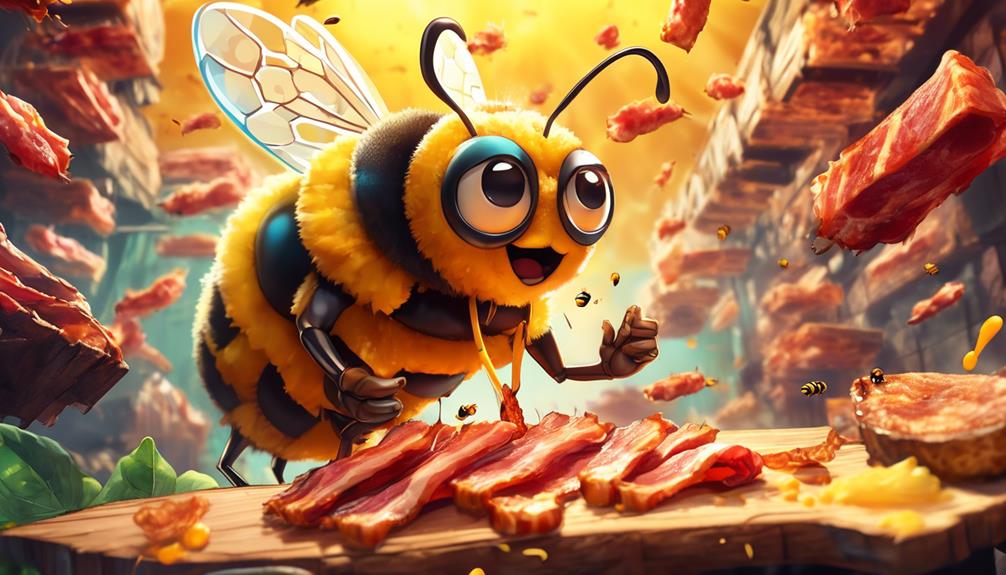
Despite the intriguing findings of bees' preference for salty substances like bacon, it's important to understand the potential risks and implications of actually feeding them such food items.
Firstly, bacon isn't a natural part of a bee's diet. Bees are nectarivores, meaning their primary food source is nectar and pollen from flowers. By introducing bacon or other human foods into their diet, you're potentially disrupting their natural feeding patterns and nutritional balance.
Secondly, bees need a diverse range of nutrients, which are obtained from a variety of plant species. Bacon, while high in sodium, lacks the vital nutrients like amino acids, enzymes, and vitamins that bees get from flowers.
Thirdly, bacon is processed with additives that could be harmful to bees. The nitrates, nitrites, and other preservatives in bacon are designed for human consumption, not for insects. These substances could have adverse effects on a bee's health, and by extension, the health of the hive.
Lastly, encouraging bees to feed on human food could lead to increased human-bee interactions, potentially increasing the risk of bee stings and allergic reactions in people.
Therefore, it's essential to let bees feed on their natural food sources for their health and ours.
The Bottom Line: Bees and Bacon
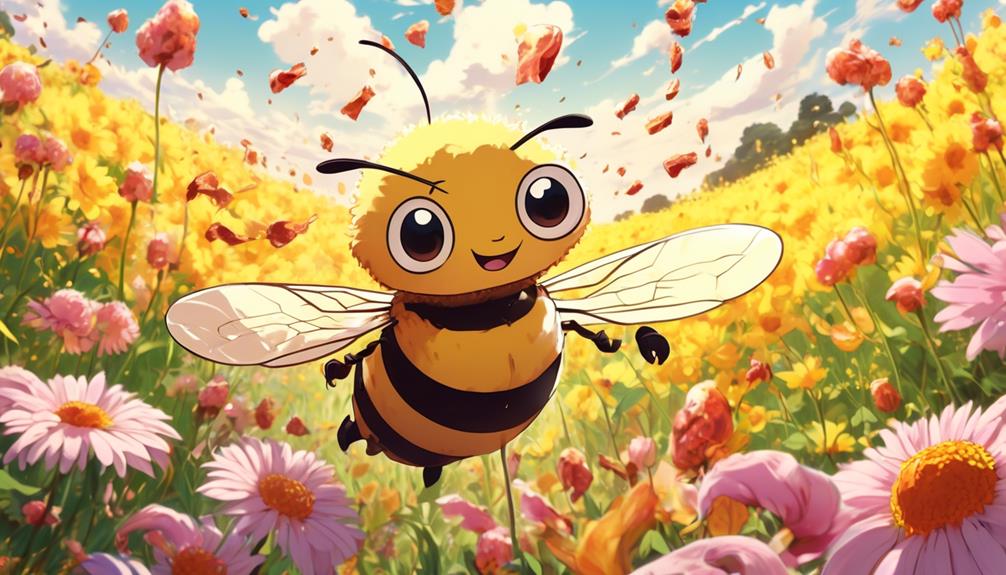
While the bacon-bee connection might pique your curiosity, it's clear that the healthiest choice for these vital pollinators is to stick to their natural diet of nectar and pollen. Bees have evolved over millions of years to efficiently process these plant-based food sources, and introducing foreign substances like bacon can disrupt their digestive processes and overall health.
Bacon, being a processed meat, contains high levels of sodium and nitrates. While you might find these flavors delectable, they're harmful to bees. High sodium levels can dehydrate bees, while nitrates, converted to nitrites in the bee's body, can cause methemoglobinemia, a condition that reduces the oxygen-carrying capacity of their hemolymph (bee's version of blood).
Adding to this, bees, unlike humans, lack the necessary enzymes to break down complex proteins found in meat. Thus, they can't derive any nutritional value from bacon.
It's also important to remember that bees are crucial for our ecosystem, acting as pollinators for a significant portion of our food supply.
Frequently Asked Questions
Can Bees Be Attracted to Other Meat Products Apart From Bacon?"
You're asking if bees might be drawn to other meats besides just bacon. Technically, it's not the meat bees are after, but rather the salts and minerals. Bees need these for their diet and they can find them in unexpected places, like your barbecue.
However, it's not common for bees to go for meat. They're much more attracted to sweet things, like nectar and fruit. Their interest in your picnic is more likely about the soda than the sausage.
What Types of Bacon Are Most Attractive to Bees?"
You're curious about the types of bacon that attract bees the most. It's not about the type, but the sweetness and saltiness of bacon that can pique a bee's interest.
However, it's important to note bees primarily seek flowers for their nectar and pollen. Meats aren't in a bee's regular diet, but they might be lured by the aroma.
Yet, bees don't specifically 'like' bacon or any type of meat.
Does the Smell of Cooked Bacon Affect Bees Differently Than Raw Bacon?"
You're wondering if the aroma of cooked bacon impacts bees differently than raw. No scientific study has conclusively shown this.
However, bees are attracted to fragrances, particularly floral ones. Bacon's smell, either raw or cooked, isn't likely to entice bees as it doesn't resemble their preferred food sources. They're more interested in nectar and pollen, so you won't see bees buzzing around your breakfast plate anytime soon.
Is There Any Possibility That Feeding Bees Bacon Can Impact Their Honey Production?"
You're curious if feeding bees bacon impacts honey production. While it's an unconventional approach, it's likely not beneficial.
Bees need a diet of nectar and pollen for optimal health and honey production. Bacon, being high in fat and salt, isn't suitable for their dietary needs.
It's also worth noting that introducing foreign substances into a hive could disrupt the bees' natural behavior and potentially harm their health.
What Other Unusual Foods Have Been Observed in Bees' Diets?"
You might be surprised to learn that bees have been observed consuming a variety of unusual foods. For instance, they've been seen feeding on fermented fruit juices, which can actually make them appear intoxicated.
They've also been noted to consume meat products when other food sources are scarce.
It's important to remember, however, that these aren't typical parts of a bee's diet and they're much more likely to stick to nectar and pollen.
Conclusion
So, do bees like bacon? Not really. While bees are drawn to salty foods, bacon's high fat content isn't ideal for their dietary needs. Scientific experiments confirm bees prefer natural nectar.
Feeding bees bacon could harm their health, disrupting the delicate balance of their ecosystem. Thus, it's best to leave bacon off the bee menu.
Their favorite food remains flowers' nectar, contributing to their vital role in our planet's biodiversity.

